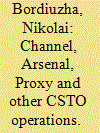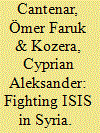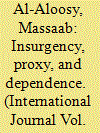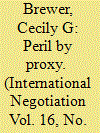|
|
|
Sort Order |
|
|
|
Items / Page
|
|
|
|
|
|
|
| Srl | Item |
| 1 |
ID:
172569


|
|
|
|
|
| Summary/Abstract |
Current dynamics in UCAV proliferation in the Middle East signal that combat drones have become key strategic enablers for state actors in the region, and are no longer seen as an optional asset. With the development of a multitude of indigenous UCAV projects, and the arrival of Chinese-made armed drones on the international market, military procurement in the Middle East has entered a new phase, in which possessing armed drone capabilities is becoming the norm. This article examines the operational and strategic considerations driving Middle Eastern states’ UCAV procurement policies, analysing those countries who have been focusing on armed drones for combat purposes and additional intelligence, surveillance, target acquisition, and reconnaissance (ISTAR) needs. The main drivers behind this trend are the operational and strategic advantages brought about by UCAVs, where the benefits related to cost, reliability, and operational risk mitigation are matched by the increased ability to project power that the platform allows, either through deniability or by making UCAVs available to proxies and allies.
|
|
|
|
|
|
|
|
|
|
|
|
|
|
|
|
| 2 |
ID:
090065


|
|
|
|
|
| Publication |
2009.
|
| Summary/Abstract |
The Organization provides an effective format for active joint efforts in countering drug trafficking, illegal migration, organized crime, and other outstanding problems. Effective mechanisms have been created to coordinate national efforts - e.g., CSTO auxiliary bodies comprising the heads of relevant national agencies, coordination councils on countering drug trafficking, illegal migration and emergency situations, as well as working groups of experts as part of the Security Council Secretaries Committee on matters of IT and security policy, and the fight against terrorism and extremism.
|
|
|
|
|
|
|
|
|
|
|
|
|
|
|
|
| 3 |
ID:
163514


|
|
|
|
|
| Summary/Abstract |
China's education system uses exams to measure students' ability. How does the labor market reward the ability that raises exam scores? This paper uses proxies to estimate the labor market returns to ‘exam ability’ in China. The estimated returns to one standard deviation of the ‘exam ability’ are 8% in 2002, 12% in 2007, and 7% in 2013 for the urban population with local hukou and high school and above education. The exam ability explains more wage variation than years of schooling or the level of education degree. There is still a significant amount of unexplained wage variation. It is possible that there are more important labor market skills that are not captured by schooling and exam scores.
|
|
|
|
|
|
|
|
|
|
|
|
|
|
|
|
| 4 |
ID:
184180


|
|
|
|
|
| Summary/Abstract |
This paper analyses the Operation Euphrates Shield (OES) al-Bab battle and presents the lessons learned. OES started with a mixed force of Free Syrian Army, Turkish special forces and armoured units. During the operation, the aims and the force structure gradually changed, yet not the command structure. When OES aimed to capture al-Bab, ISIS employed conventional active defence strategy. The OES commander’s insistence on employing special forces increased own casualties and al-Bab was seized only after resorting to a conventional urban attack. OES presents tactical and operational lessons for the militaries on structure and execution of operations against an irregular adversary employing conventional means.
|
|
|
|
|
|
|
|
|
|
|
|
|
|
|
|
| 5 |
ID:
192882


|
|
|
|
|
| Summary/Abstract |
Patron states provide their proxies with support for a variety of reasons. To better understand the relationship between states and their proxies, it is important to deconstruct the different means of support. For instance, even after an armed group gains economic and military autonomy, ideological affiliation can be an important factor. The ideological convictions of individuals within an armed group serve as a compass for the actions of the larger group, especially in relations to the patron state. This is the case with Hezbollah. Today, the group has outgrown its dependence on Iran for military and economic support; nevertheless, it remains committed to the ideals of Iran's revolution.
|
|
|
|
|
|
|
|
|
|
|
|
|
|
|
|
| 6 |
ID:
102498


|
|
|
|
|
| Publication |
2011.
|
| Summary/Abstract |
A proxy war is a conflict in which one party fights its adversary via another party rather than engaging that party in direct conflict. This article discusses two examples: the Sudan-Ugandan proxy war of the 1990s and the Sudan-Chad proxy war that has fed the conflict in Darfur. In these cases, the states aimed to alter regional power structures through cross-border rebel support. This support generated a perpetual Prisoners' Dilemma whereby the patron governments refused to end proxy support unless the other side did as well, but had little reason to trust that the other side would do so. The Sudan-Uganda and Sudan-Chad peace processes succeeded in reaching agreement, but failed in implementation. Permanent resolution of such complex, persistent, and deadly conflicts requires conflict analyses that take a regional view; conflict mediation that seeks to alter the underlying conflict dynamics through addressing the motivations of both patrons and proxies; and implementation agreements backed by strong guarantees.
|
|
|
|
|
|
|
|
|
|
|
|
|
|
|
|
|
|
|
|
|